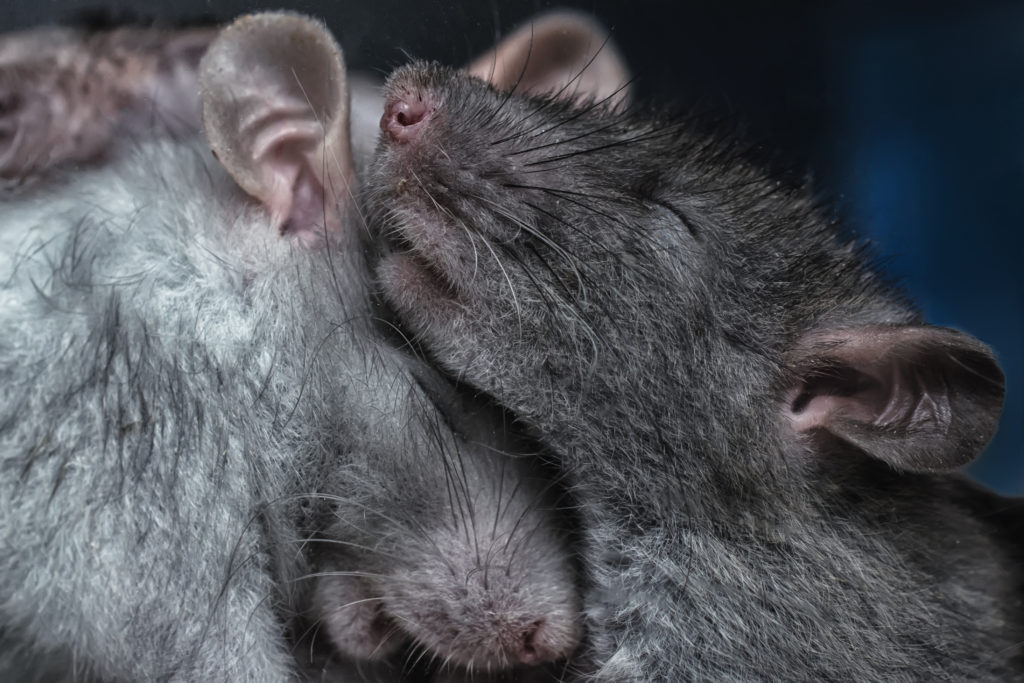Quick Hits
Daily brief research updates from the cognitive sciences

I have reported in other places on the social regions of the brain (for review see here). And this has indeed been the standard approach – try to identify the specific regions in the brain that engage in a particular activity.
However, this research adds an interesting twist to the concept of the social brain. Japanese researchers at Tohoku University and the University of Tokyo have discovered electrical brain wave patterns related to social behaviour in mice.
What did they find?
First, they found that there was a brain wave signature in social interactions. These came from regions we already know are associated with social behaviour namely a region called the medial prefrontal cortex, in the front of the brain, associated with social behaviours, and the amygdala which is well-known as an emotional and attentional centre.
When mice were socialising theta waves (slow waves) decreased and gamma (fast waves) increased. This is in itself interesting and gives another neural signature that is easier to measure than brain scanning. But mice that had poor social skills or that exhibited signs of depression or autism (yes, you can measure this in mice) lacked this brain wave pattern.
The critical question is: can these brain waves patterns actually influence social behaviour? Through optogenetics the researchers were able to stimulate the social brain wave patterns in these social dysfunctional mice and yes, their social behaviour normalised.
In short, a pretty amazing piece of research that shows that brain waves are critical to social interactions, and these can also be manipulated (in mice that is) to improve social behaviour. Not in humans yet, unfortunately!●

Andy Habermacher
Andy is author of leading brains Review, Neuroleadership, and multiple other books. He has been intensively involved in writing and research into neuroleadership and is considered one of Europe’s leading experts. He is also a well-known public speaker speaking on the brain and human behaviour.
Andy is also a masters athlete (middle distance running) and competes regularly at international competitions (and holds a few national records in his age category).
Reference
Nahoko Kuga, Reimi Abe, Kotomi Takano, Yuji Ikegaya, Takuya Sasaki.
Prefrontal-amygdalar oscillations related to social behavior in mice.
eLife, 2022; 11
DOI: 10.7554/eLife.78428
More Quick Hits
Smartphones Improve Your Memory
Quick HitsDaily brief research updates from the cognitive sciencesany people believe that using smartphones and other electronic devices is ruining our memories and ability to think or simply use our brains. Research has shown a more nuanced...
How Meditation Helps Pain In Your Brain
Quick HitsDaily brief research updates from the cognitive sciences es, meditation can help with pain by changing your experience of it. I reported on that here. Another piece of research just published shows that how experienced meditators and...
When Stress Is Good For Brain Functioning
Quick HitsDaily brief research updates from the cognitive sciences tress gets a bad rap – understandably it is a negative experience and has been shown over long periods of time, and with high intensity, to cause multiple negative outcomes, from...
Put Your Smartphone Down and Let your Mind Wander – You’ll Be Happier
Quick HitsDaily brief research updates from the cognitive sciences here’s a lot been said about smartphone usage and how it can be used and abused. Most of this concern revolves around usage in children or teenagers, however, with some research...
The Amazing Impact Of Reaching Out To Your Old Friends
Quick HitsDaily brief research updates from the cognitive sciences few weeks ago a friend I hadn’t seen for about 10 years sent me a message and asked if I had time to meet up. I was elated. "Sure," I immediately messaged back, "when and where?!"...
Really? Belief In Conspiracies Not Increasing
Quick HitsDaily brief research updates from the cognitive sciences e may feel like we’re in an age of conspiracy theories, that social media is turbocharging the wild and wacky theories, and the so-called information bubbles are sending people down...






